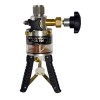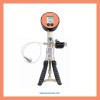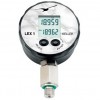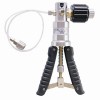Pneumatic and hydraulic hand pumps for calibrating pressures or vacuums in conjunction with a pressure transfer standard.
Find a hand pump for precise setting of calibration pressures in the laboratory, factory or process plant.
Pneumatic calibration pumps for manually generating precise air pressure setpoints for calibrating pressure instruments with a precision pressure indicator.
Products
 PGS1000 Handheld Hydraulic Pressure Test Pump - Hand portable scissor pump for generating hydraulic pressures up to 1000 bar (14,500 psi).
PGS1000 Handheld Hydraulic Pressure Test Pump - Hand portable scissor pump for generating hydraulic pressures up to 1000 bar (14,500 psi). PGS700 High Pressure Calibration Hand Pump - Hydraulic hand pump for applying test and calibration pressures with precision from 0 to 700 bar gauge (10,000 psi)
PGS700 High Pressure Calibration Hand Pump - Hydraulic hand pump for applying test and calibration pressures with precision from 0 to 700 bar gauge (10,000 psi)
Applications
 30bar pressure calibration handpump kit & 0.2% acc test gauge - Calibration hand pump kit with pressure gauge with 0.2%FS accuracy and 30bar range calibrated using a traceable international standard
30bar pressure calibration handpump kit & 0.2% acc test gauge - Calibration hand pump kit with pressure gauge with 0.2%FS accuracy and 30bar range calibrated using a traceable international standard Manufacturing acceptance testing -10…50 psi portable air pump and pressure gauge - Digital display pressure gauge for portable use in manufacturing acceptance testing applications, capable of measuring over -10 to 50 psi gauge pressure with 0.1% accuracy and connected using a 1/4 NPT male fitting. Also includes a USB cable, cal pump, log software and UKAS cal cert.
Manufacturing acceptance testing -10…50 psi portable air pump and pressure gauge - Digital display pressure gauge for portable use in manufacturing acceptance testing applications, capable of measuring over -10 to 50 psi gauge pressure with 0.1% accuracy and connected using a 1/4 NPT male fitting. Also includes a USB cable, cal pump, log software and UKAS cal cert. 3000 psi high pressure calibration hand pump and gauge - High pressure hand pump and electronic digital pressure gauge for calibrating pressures up to 3000 psi max.
3000 psi high pressure calibration hand pump and gauge - High pressure hand pump and electronic digital pressure gauge for calibrating pressures up to 3000 psi max. 20,000 kilopascal portable pressure calibrator - Calibrator for setting and checking pressures precisely up to 20,000 kPa gauge.
20,000 kilopascal portable pressure calibrator - Calibrator for setting and checking pressures precisely up to 20,000 kPa gauge.
 Calibrate air pressure gauges ranging to 60psi with NPT fittings
Calibrate air pressure gauges ranging to 60psi with NPT fittings Calibration kit for calibrating 22 psi air pressure gauges
Calibration kit for calibrating 22 psi air pressure gauges 10 to 1000 bar range pressure gauge calibration tool kit
10 to 1000 bar range pressure gauge calibration tool kit Calibrator for 10 mH2O range liquid level instrumentation
Calibrator for 10 mH2O range liquid level instrumentation 400 bar hand pump and digital gauge for testing gauges
400 bar hand pump and digital gauge for testing gauges 200 kg/cm² calibration hand pump & test gauge
200 kg/cm² calibration hand pump & test gauge Combined vacuum and 100 psi calibration hand pump
Combined vacuum and 100 psi calibration hand pump 14,500 psi hand held portable hydraulic pressure calibration pump
14,500 psi hand held portable hydraulic pressure calibration pump
- Spot-check pressure gauge tester for ranges up to 350 psi
- Precision hand pump with 1/4 NPT test gauge mount for -0.9 to 40 bar
- Economical calibration kit for psi & inHg pressure gauges
Questions & Answers about Calibration Hand Pumps
When to use pneumatic or hydraulic calibration pump
How do I decide whether to use a pneumatic calibration pump or hydraulic calibration pump?
Hydraulic calibration pumps are most commonly used for generating high level calibration pressures such as 700 bar or 10,000 psi.
Pneumatic calibration pumps are used to generate lower calibration pressures such as 20 bar, or a suction pressure to create a vacuum.
Air is often used to calibrate pressure instrumentation normally used on fluids, but it is less common to use liquids to calibrate air or gas pressure instrumentation either because it will lead to contamination of the process being measured by the device or will damage the sensing technology only designed for dry use.
Using only normal operation media to calibrate
Should pressure transmitters be calibrated using the same or similar media as which is measured in normal operation?
If the sensor uses a diaphragm technology to measure pressure, then the applied pressure will be the same regardless of media type. As long as the materials within the the pump and the sensor are compatible with the media used you can use gas or liquids.
Using pneumatic calibration pump with oil
If I have a pneumatic calibration pump should I use a separator on it to protect it from oil?
Yes, generally most pneumatic pumps should only be used to calibrate sensors which are dry with all traces of moisture removed. This is particularly important if the pneumatic pump is used to calibrate other equipment that must not come into contact with oil. So if the device you are testing has been measuring oil pressure, then it is advisable to use an air/oil separator or remove all traces of oil by other means to ensure that no oil contaminates the pump.
Cleaning oil calibrated devices before re-fitting
Do I need to clean devices that have been calibrated on oil before re-fitting?
Some processes are sensitive to contamination so you will need to ensure in these cases that the sensor is cleaned to the appropriate standard before re-installing after calibration.
Using the same oil in pump as used in service
If using a hydraulic calibration pump, should the pump be filled with the same oil as normally measured by the pressure sensing device in normal service?
Each type of hydraulic pump will have its own list of compatible media and component materials, some will work with mineral oil only, some can be used with more aggressive oils, and some can be used on water. If it is not possible to match the media type to the pump then you will need to use a diaphragm separator to isolate the two different liquids, whilst allowing the transmission of pressure from one side to the other. Alternatively if the device under test is compatible with a pump media which is different to the operational media, then you just need to ensure the it is adequately cleaned before putting the device back into service.
